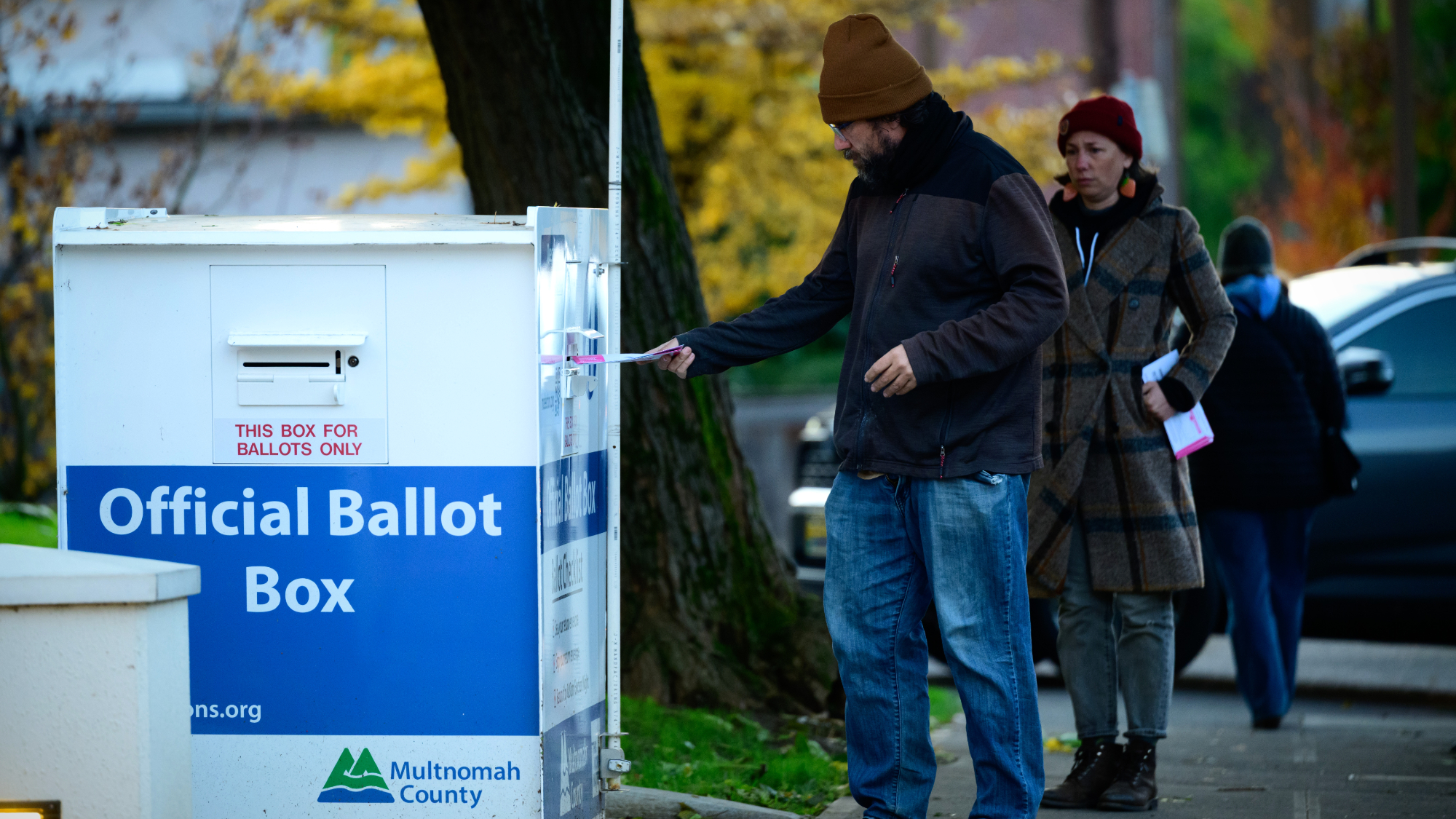Why did Oregon recriminalize drug possession?
Arrests resume in the Beaver State, along with a new treatment effort


A free daily email with the biggest news stories of the day – and the best features from TheWeek.com
You are now subscribed
Your newsletter sign-up was successful
Oregon's experiment with drug decriminalization is over. Gov. Tina Kotek (D) on Monday approved a new law that recriminalizes the possession of small amounts of "hard drugs" — but also "expands funding for substance abuse treatment," Oregon Public Broadcasting said. The measure comes four years after Beaver State voters backed a ballot measure to end arrests for people found possessing cocaine, fentanyl and methamphetamine in amounts meant for personal use.
That 2020 vote was "celebrated as a groundbreaking step toward a compassionate approach to substance use disorders," said The Guardian. But Oregonians now say that step coincided with a "spiraling drug use" that accompanied an "epidemic of cheap, widely available" fentanyl, a rise in homelessness and a shocking increase in overdose deaths. The state saw nearly 1,000 opiate overdose fatalities in 2022. "Oregon was a leader in this space," Haven Wheelock, a harm-reduction advocate, said of recriminalization. "It will set us back."
Others see a different lesson, NBC News said. "Combatting a problem by decriminalizing the problem is bad policy," Oregon Senate Republicans said in a statement. Opponents of the new law, though, worry that it will do little to put a dent in addiction problems in the state. And they lament what might have been. "We were too progressive," said one outreach worker. "Society wasn't ready for it."
The Week
Escape your echo chamber. Get the facts behind the news, plus analysis from multiple perspectives.

Sign up for The Week's Free Newsletters
From our morning news briefing to a weekly Good News Newsletter, get the best of The Week delivered directly to your inbox.
From our morning news briefing to a weekly Good News Newsletter, get the best of The Week delivered directly to your inbox.
Failure? Or misunderstood?
"No, Oregon's drug decriminalization law was not a failure," Robert Gebelhoff said at The Washington Post. Yes, the law was "seriously flawed." But there's "no evidence" the law created Oregon's current drug problem — the state has "fared no worse in terms of overdose deaths in recent years than similar states." The more likely culprit for those deaths: "The pandemic and the rise of fentanyl." Returning to the days of jailing Oregonians won't help. "Research consistently shows that people are at higher risk of overdose after incarceration."
Decriminalization has been an "unquestionable failure," Kevin Sabet said at Newsweek. It resulted in "more overdose deaths, crime, and public drug use." Officials were so overwhelmed by the problems that they declared a state of emergency in downtown Portland in January. None of this should have been a surprise, and it explains why Oregonians soured on the experiment so quickly. "When our laws send a message that drugs are not of public concern, what did we think would happen?"
Did Oregon give up too soon? Decriminalization advocates point to Portugal, Politico said, which has seen a 75% drop in drug deaths after adopting a similar strategy in 2001. That success "wasn't achieved overnight or even in three years," those advocates say. Portugal had something that Oregon didn't: An "expansive and trusted public health network" with experience in addiction treatment. "These things take time," said one Portuguese official. That's time Oregon no longer has.
'The war on drugs didn't work'
Portland Mayor Ted Wheeler backed the new law, The New York Times said, but he isn't interested in a full-blown return to the old ways. "The war on drugs didn't work," he said. While it is "necessary" to give law enforcement the tools to deal with drug problems, officials must also do the "hard work to build the behavioral health infrastructure that was lacking." The biggest problem with the decriminalization law was a failure to have those support services in place, Wheeler said. "The treatment infrastructure has to be in place first."
A free daily email with the biggest news stories of the day – and the best features from TheWeek.com
That may happen under the new law. It will put $211 million into new programs, Oregon Capital Chronicle said, including "new and expanded residential treatment facilities, recovery houses" and other efforts to treat drug addiction. Arrests for drug possession will return, but they won't be the only tool in the state's toolbox. The new law, Gov. Tina Kotek said, "represents a package that encourages treatment first, while balancing the need for accountability."
Joel Mathis is a writer with 30 years of newspaper and online journalism experience. His work also regularly appears in National Geographic and The Kansas City Star. His awards include best online commentary at the Online News Association and (twice) at the City and Regional Magazine Association.
-
 Local elections 2026: where are they and who is expected to win?
Local elections 2026: where are they and who is expected to win?The Explainer Labour is braced for heavy losses and U-turn on postponing some council elections hasn’t helped the party’s prospects
-
 6 of the world’s most accessible destinations
6 of the world’s most accessible destinationsThe Week Recommends Experience all of Berlin, Singapore and Sydney
-
 How the FCC’s ‘equal time’ rule works
How the FCC’s ‘equal time’ rule worksIn the Spotlight The law is at the heart of the Colbert-CBS conflict
-
 Big-time money squabbles: the conflict over California’s proposed billionaire tax
Big-time money squabbles: the conflict over California’s proposed billionaire taxTalking Points Californians worth more than $1.1 billion would pay a one-time 5% tax
-
 Trump's ‘weaponization czar’ demoted at DOJ
Trump's ‘weaponization czar’ demoted at DOJSpeed Read Ed Martin lost his title as assistant attorney general
-
 Did Alex Pretti’s killing open a GOP rift on guns?
Did Alex Pretti’s killing open a GOP rift on guns?Talking Points Second Amendment groups push back on the White House narrative
-
 Judge tosses DOJ petition for Oregon voter data
Judge tosses DOJ petition for Oregon voter dataSpeed Read The decision was made following a letter sent by the DOJ to Minnesota
-
 Washington grapples with ICE’s growing footprint — and future
Washington grapples with ICE’s growing footprint — and futureTALKING POINTS The deadly provocations of federal officers in Minnesota have put ICE back in the national spotlight
-
 ‘One day fentanyl will come back — and there will be little anyone can do’
‘One day fentanyl will come back — and there will be little anyone can do’Instant Opinion Opinion, comment and editorials of the day
-
 Can anyone stop Donald Trump?
Can anyone stop Donald Trump?Today's Big Question US president ‘no longer cares what anybody thinks’ so how to counter his global strongman stance?
-
 Trump’s Greenland ambitions push NATO to the edge
Trump’s Greenland ambitions push NATO to the edgeTalking Points The military alliance is facing its worst-ever crisis
